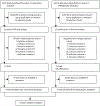Disease-free survival as a surrogate for overall survival in patients with HER2-positive, early breast cancer in trials of adjuvant trastuzumab for up to 1 year: a systematic review and meta-analysis
- PMID: 30709633
- PMCID: PMC7050571
- DOI: 10.1016/S1470-2045(18)30750-2
Disease-free survival as a surrogate for overall survival in patients with HER2-positive, early breast cancer in trials of adjuvant trastuzumab for up to 1 year: a systematic review and meta-analysis
Erratum in
-
Correction to Lancet Oncol 2019; 20: 361-70.Lancet Oncol. 2019 Mar;20(3):e132. doi: 10.1016/S1470-2045(19)30110-X. Lancet Oncol. 2019. PMID: 30842056 No abstract available.
Abstract
Background: Although frequently used as a primary endpoint, disease-free survival has not been validated as a surrogate for overall survival in early breast cancer. We investigated this surrogacy in the adjuvant setting of treatment with anti-HER2 antibodies.
Methods: In a systematic review and meta-analysis, we identified published and non-published randomised controlled trials with completed accrual and available disease-free survival and overall survival results for the intention-to-treat population as of September 2016. Bibliographic databases (MEDLINE, Embase, and Cochrane Central Register of Controlled Trials), clinical trial registries (Clinicaltrials.gov, EU Clinical Trials Register, WHO International Clinical Trials Registry Platform, and PharmNet.Bund), and trial registries from relevant pharmaceutical companies were searched. Eligibility for treatment of HER2-positive early breast cancer required at least one group to have an anti-HER antibody treatment (ie, trastuzumab, pertuzumab, or trastuzumab emtansine) planned for 12 months, and at least one control arm with chemotherapy without the antibody, a lower total dose or duration of the antibody, or observation alone. Units of analysis were contrasts: two-group trials gave rise to one contrast, whereas trials with more than two groups gave rise to more than one contrast. We excluded trials enrolling patients with recurrent, metastatic, or non-invasive disease, and those testing neoadjuvant therapy exclusively. Our primary objective was to estimate patient-level and trial-level correlations between disease-free survival and overall survival. We measured the association between disease-free survival and overall survival using Spearman's correlation coefficient (rs), and the association between hazard ratios (HRs) for disease-free survival and overall survival using R2. We computed the surrogate threshold effect, the maximum HR for disease-free survival that statistically predicts an HR for overall survival less than 1·00 in a future trial.
Findings: Eight trials (n=21 480 patients) gave rise to a full set (12 contrasts). Patient-level associations between disease-free and overall survival were strong (rs=0·90 [95% CI 0·89-0·90]). Trial-level associations gave rise to values of R2 of 0·75 (95% CI 0·50-1·00) for the full set. Subgroups defined by nodal status and hormone receptor status yielded qualitatively similar results. Depending on the expected number of deaths in a future trial, the surrogate threshold effects ranged from 0·56 to 0·81, based on the full set.
Interpretation: These findings suggest that it is appropriate to continue to use disease-free survival as a surrogate for overall survival in trials in HER-2-positive, early breast cancer. The key limitation of this study is the dependence of its results on the trials included and on the existence of an outlying trial.
Funding: Roche Pharma AG.
Copyright © 2019 Elsevier Ltd. All rights reserved.
Conflict of interest statement
Declaration of interests
EDS and PS report grants from Roche Pharma AG to the International Drug Development Institute (their employer) during the conduct of the study. SD reports grants, personal fees, and non-financial support from Roche-Genentech, and grants and personal fees from Puma, outside of the submitted work. MP-G reports personal fees from Roche-Genentech, outside of the submitted work. DS reports consultancy for Novartis, Eli Lilly, and Seattle Genetics, and is a board member at BioMarin. NW reports grants from the National Cancer Institute, during the conduct of the study. MB is an employee and holds stock at the International Drug Development Institute. All other authors declare no competing interests.
Figures



Comment in
-
Endpoint selection in HER2-positive early breast cancer.Lancet Oncol. 2019 Mar;20(3):315-316. doi: 10.1016/S1470-2045(18)30779-4. Epub 2019 Jan 29. Lancet Oncol. 2019. PMID: 30709632 No abstract available.
References
-
- Piccart-Gebhart MJ, Procter M, Leyland-Jones B, et al. Trastuzumab after adjuvant chemotherapy in HER2-positive breast cancer. N Engl J Med 2005; 353: 1659–72. - PubMed
-
- Romond EH, Perez EA, Bryant J, et al. Trastuzumab plus adjuvant chemotherapy for operable HER2-positive breast cancer. N Engl J Med 2005; 353: 1673–84. - PubMed
-
- Joensuu H, Kellokumpu-Lehtinen PL, Bono P, et al. Adjuvant docetaxel or vinorelbine with or without trastuzumab for breast cancer. N Engl J Med 2006; 354: 809–20. - PubMed
Publication types
MeSH terms
Substances
Grants and funding
LinkOut - more resources
Full Text Sources
Medical
Research Materials
Miscellaneous

